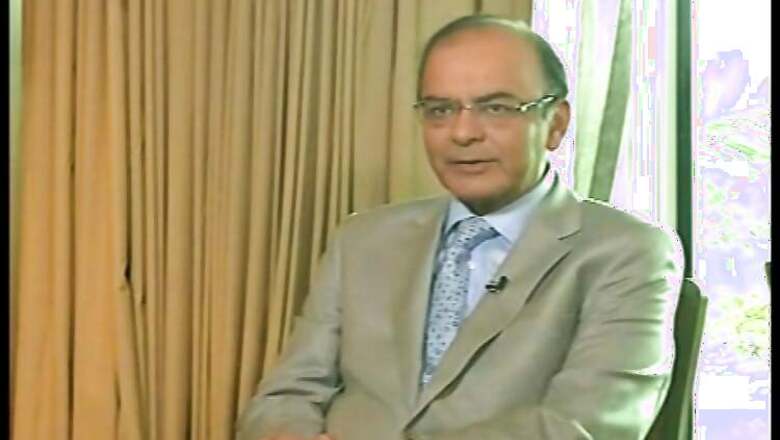
views
New York: India's Finance Minister Arun Jaitley blamed the mindset of 1971 that believed in slogans and redistribution rather than growth and higher productivity for the lost opportunities of the last decade and said India is trying to make up for it now as decision-makers are under people's pressure to ensure the country reaches its full potential.
Speaking at Columbia University on Monday, Jaitley said former Prime Minister Manmohan Singh "was overpowered by someone" whose thoughts were stuck in 1971 without directly name Congress Party President Sonia Gandhi and he seemed to give Singh the benefit of the doubt.
He said that unlike 1971 this was an era of rising expectations of growth and people see the potential for India to achieve 8 percent or 9 percent growth. No people put pressure on decision-makers to achieve this potential, he added. In 2015, the nation cannot exist on slogans alone as in 1971, he said alluding to Indira Gandhi's massive election victory that came with her call, "Garibi Hatao," or "Banish Poverty."
The rationalisation of subsidies carried out by Prime Minister Narendra Modi's government, he said, was the "unsung revolution in India."
Jaitley was the keynote speaker at the inauguration of the Deepak and Neera Raj Center on Indian Economic Policies at Columbia University's School of Public and International Affairs. The founding of the Center is financed by Deepak Raj, who is the managing director of the private investment firms Rush Brook Partners and Raj Associates, and his wife Neera.
Jaitley touched on the key changes that were taking place in India that impacted the economy. Realising that international investment is important to raise resources for development, India is dealing with the issues that discouraged it.
India had a bad reputation for ease of doing business and a change in governance is taking place at the central level, he said. No ministry holds up clearances, which are done in days, and Prime Minister Narendra Modi personally reviews projects that are delayed.
A concept of "competitive federalism" was taking root with states now vying to make themselves attractive for investments, he said. Even Kerala and West Bengal, which had a leftist orientation, have stated to reorient themselves, he added.
On taxes, he said "we lost credibility with the world" because of the retrospective taxation issue. "Aggressive taxation" has not produced results because ultimately it is overturned by courts and the government taken steps so now the fears of retrospective taxes have been put to rest.
In dealing with natural resources, the previous government used a discretionary process, which led to the scandals in mining and cellphone spectrum allocation, he said. Now the government was letting the markets decide the allocations in a transparent manner, he added.
Jagish Bhagwati, the eminent economist, said that Directive Principles of the Indian Constitution were made into rights enforceable by courts and when there isn't economic growth commensurate to pay for the entitlements, deficits rise hurting development.
Bhagwati, who is the director of the Center, criticised the prevailing shallow discourse on India in some quarters in the US. As an example, he took at dig at the op-ed pages of The New York Times, which, he said, relied on people from think tanks who do a little thinking and then go after India on tanks.
India's Ambassador to the US, Arun Kumar Singh, said that the Center should promote a better understanding of India among a broader section of the US and help shape the narrative. He mentioned the use of "loaded words" like "outsourcing," which has a negative association. While virtually anything bought in the US is made outside in places where the manufacturing has shifted, that is not called outsourcing, a word used when tech sector jobs move to India;
Another example he gave was the perception of Indian and intellectual property rights. While India is often portrayed as not conforming to the norms, the tech sector has said that it had no problems with the country over intellectual property rights, he said. In entertainment, both Indian and US industries had concerns, he said.
Only the pharmaceutical sector had made an issue of intellectual property rights in India and these were because of corporate reasons, rather than actual patent issues, he said. He said that there was growing interest in India among businesses and among students. In many universities there was a demand for teachers to teach courses on India, he said.
Among the reasons for the deepening ties between the US and India seen in the dramatic increase in trade between the two countries and in close political and strategic ties, Singh said was the role of the Indian diaspora: There were 110,000 Indian doctors, many working in remote areas; 40 percent of all the hotel rooms in the US are in Indian-owned businesses, and 140,000 students from India are studying in the US.
Moreover, Indian companies have invested $15 billion in the US and created 90,000 jobs, Singh said.
Deepak Raj said India is now at a critical juncture and is poised for a breakout in creating jobs and providing better health and education. He said he wanted the institute to be a part of the solution in meeting these goals.
The school's dean, Merit Janow, outlined the center's goals of promoting new policy-oriented research and dialogue on the Indian economy and disseminating the information to policy-makers, researchers and students.



















Comments
0 comment